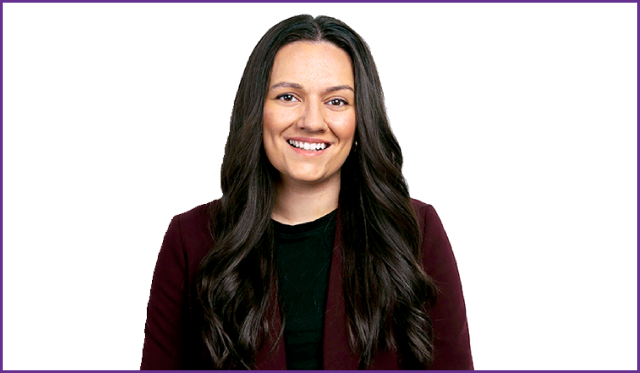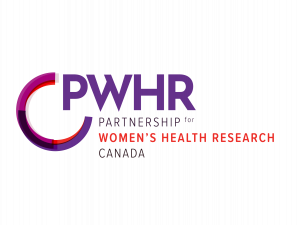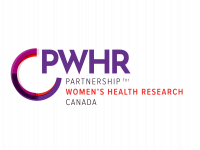|
News from PWHR ͏ ͏ ͏ ͏ ͏ ͏ ͏ ͏ ͏ ͏ ͏ ͏ ͏ ͏ ͏ ͏ ͏ ͏ ͏ ͏ ͏ ͏ ͏ ͏ ͏ ͏ ͏ ͏ ͏ ͏ ͏ ͏ ͏ ͏ ͏ ͏ ͏ ͏ ͏ ͏ ͏ ͏ ͏ ͏ ͏ ͏ ͏ ͏ ͏ ͏ ͏ ͏ ͏ ͏ ͏ ͏ ͏ ͏ ͏ ͏ ͏ ͏ ͏ ͏ ͏ ͏ ͏ ͏ ͏ ͏ ͏ ͏ ͏ ͏ ͏ ͏ ͏ ͏ ͏ ͏ ͏ ͏ ͏ ͏ ͏ ͏ ͏ ͏ ͏ ͏ ͏ ͏ ͏ ͏ ͏ ͏ ͏ ͏ ͏ ͏ ͏ ͏ ͏ ͏ ͏ ͏ ͏ ͏ ͏ ͏ ͏ ͏ ͏ ͏ ͏ ͏ ͏ ͏ ͏ ͏ ͏ ͏ ͏ ͏ ͏ ͏ ͏ ͏ ͏ ͏ ͏ ͏ ͏ ͏ ͏ ͏ ͏ ͏ ͏ ͏ ͏ ͏ ͏ ͏ ͏ ͏ ͏ ͏ ͏ ͏ ͏ ͏ ͏ ͏ ͏ ͏ ͏ ͏ ͏ ͏ ͏ ͏ ͏ ͏ ͏ ͏ ͏ ͏ ͏ ͏ ͏ ͏ ͏ ͏ ͏ ͏ ͏ ͏ ͏ ͏ ͏ ͏ ͏ ͏ ͏
|
Dear PWHR community,
Welcome back to the 2025-2026 academic year! We’re excited about your participation with PWHR to continue fostering a national dialogue that shares cutting edge women’s health research, builds networks, and contributes to advancing the health of women, trans, and non-binary people.
Calling all trainees! Are you wondering about where your research skills and interest in women’s, trans, and non-binary health might take you professionally? Join PWHR on October 20, 2025 for a virtual mentoring session. Meet two fantastic mentors, Dr. Alexa Yakubovich and Dr. Victoria Gay, and have an in-depth, informal discussion with them and other trainees from across Canada.
We’re also thrilled to be featuring the winners of the Mid-Career Excellence in Women’s Health Research Award in our 2025-2026 Women’s Health Research Seminar Series. On October 30, 2025, join us to learn about “Infant-Related Harm Thoughts: Why They Matter and How to Manage Them” with Dr. Nichole Fairbrother and Samantha Buchsdrueker.Thank you for being a vital part of our vibrant women’s health research community. We look forward to connecting with you soon. Kind regards,
Tamil Kendall, PhD
Director, Partnership for Women's Health Research Canada
|
|
| |
|
Spotlight on Excellence: 2025-2026 PWHR Research Seminars
|
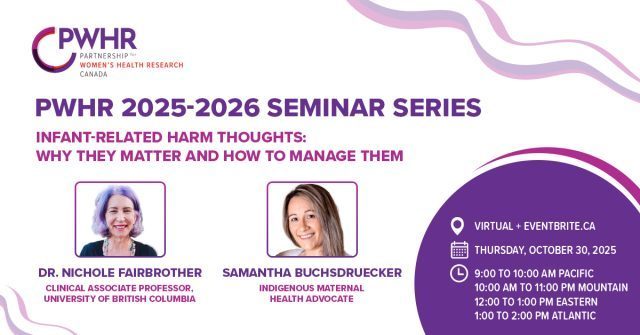
|
| |
|
We’re excited to launch the 2025–2026 PWHR Research Seminar Series, featuring recipients of the 2025 Mid-Career Excellence in Women’s Health Research Award. Each winner represents one of PWHR’s partner institutions and is recognized for their significant contributions to cutting-edge science, transforming health systems and practices research, and mentoring the next generation of researchers. The first seminar, Infant-Related Harm Thoughts: Why They Matter and How to Manage Them, will feature: - Dr. Nichole Fairbrother, Women’s Health Research Institute (WHRI)
A Clinical Associate Professor at the University of British Columbia and registered psychologist, Dr. Fairbrother leads the UBC Perinatal Anxiety Disorders Research Lab, one of the only labs in Canada focused on perinatal anxiety. Her research also addresses the highly stigmatized and misunderstood area of intrusive thoughts, obsessive-compulsive disorder (OCD) and infant safety. Her work is transforming how we screen, understand, and support perinatal mental health. - Samantha Buchsdruecker, Indigenous Mental Health Advocate
Samantha is a mixed-race Indigenous mother from Big River First Nation and a descendant of residential school and Sixties Scoop survivors. Drawing from her lived experience, she advocates for culturally safe, trauma-informed care and works to improve access to mental health, maternal health, and community resources for Indigenous families.
EVENT DETAILS: - Time: October 30, 2025
- Date:
9:00-10:00 AM PT
10:00-11:00 AM MT
12:00-1:00 PM ET
1:00-2:00 PM AT - Location: Online via Zoom
|
| |
| |
|
Upcoming Virtual Mentoring Sessions – Calling all Trainees!
|
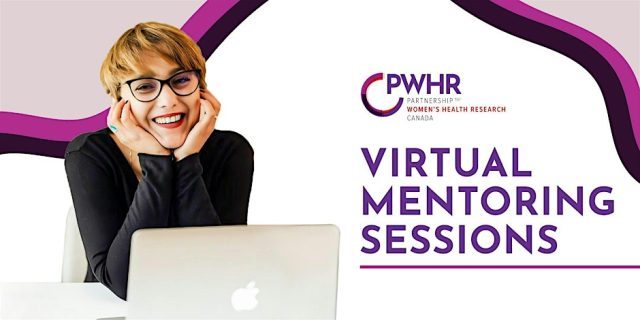
|
| |
|
Join us for an inspiring afternoon of guidance and insights from leading researchers and strategic thinkers in women’s health and social impact.
Finding Meaning on the Tenure Track: Developing an Action-Oriented Research Program on Gender-Based Violence
Dr. Alexa Yakubovich, a social epidemiologist and tenure-track Assistant Professor at Dalhousie University, leads a mixed-methods research program exploring the causes and prevention of violence against women and gender-based violence more broadly. As an Affiliate Scientist with Nova Scotia Health and the MAP Centre for Urban Health Solutions, and a Research Fellow at the Muriel McQueen Fergusson Centre for Family Violence Research, Dr. Yakubovich engages in multi-sector research that informs policy and service design across Canada and internationally.
PhD to Social Impact: Building a Career Beyond Academia
Dr. Victoria Gay, PhD in environmental science, brings over two decades of experience working at the intersection of research, strategy, and organizational change. She helps organizations in health, housing, justice, social services, social finance, and environmental sustainability maximize impact, advance advocacy, and drive innovation. With a longstanding commitment to advancing gender equity, Dr. Gay now works as a strategic consultant, translating her expertise in women’s health research and organizational strategy into meaningful social impact.
Don’t miss this opportunity to hear practical advice and insights from leaders navigating academia, research, and social impact careers. EVENT DETAILS: - Date: October 20, 2025
- Time:
9:00-10:00 AM PT
10:00-11:00 AM MT
12:00-1:00 PM ET
1:00-2:00 PM AT - Location: Online via Zoom
|
| |
| |
|
We Say Women’s Health Matters – Now It’s Time to Fund It
|
| |
In her new op-ed, Holly Mathias – doctoral candidate, Trudeau Scholar, and WCHRI trainee – calls on Canada to step up with meaningful investment in women’s health research. Globally, women’s health is underfunded, and cuts in the U.S. threaten progress here at home.
Investing in women’s health is not just good policy, it’s smart economic strategy, which supports workforce participation, education, and healthier communities. Advocates are calling for a National Women’s Health Strategy and $150M in dedicated research funding.
It’s time to act.
|
| |
| |
|
WCHRI Researcher Creates Key Resources for PCOS Diagnosis and Care
|
| |
|
Dr. Donna Vine and her team at the University of Alberta have developed essential resources to enhance the diagnosis and management of polycystic ovary syndrome (PCOS). These tools, created in collaboration with clinicians and patient partners, are already being utilized across Canada and in over 30 countries.
Their research has also revealed that women with PCOS in Alberta face a significantly higher risk of heart disease, diabetes, and obesity. Through early detection and intervention, Dr. Vine aims to mitigate these risks and improve long-term health outcomes for women affected by PCOS.
|
| |
| |
Honouring Indigenous Guidance in Research: Highlights from the POETIC Elders Circle
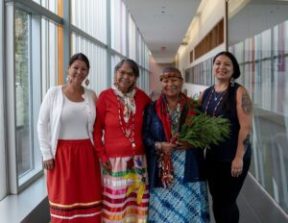
|
|
| |
In July 2025, members of the Perinatal Opioid Exposures, Trajectories, Insights and Concentrations (POETIC) Network came together for the first-ever Elders Circle, led by Matriarch Dr. Roberta Elder Price. The session focused on integrating OCAP principles – Ownership, Control, Access, and Possession – into clinical research, ensuring Indigenous ethical frameworks guide data and sample management.
The day emphasized listening to Elders, making space for ceremony, and building authentic relationships rooted in respect. Discussions explored supporting Indigenous women in reclaiming their identities, recognizing the role of fathers, and providing holistic, culturally grounded care throughout prenatal, birth, and postpartum periods, especially in the context of substance use and breastfeeding.
The event included cultural teachings by Gramma Shingoose and Elder Roberta, with remote participation from Dr. Nadine Caron and Elder Lorraine McLeod. The gathering also featured a tour of the Museum of Anthropology and a welcoming dinner, fostering community connection and resilience.
Through opportunities like the Elders Circle, the POETIC Network continues to strengthen Indigenous-led research, honour traditional knowledge, and support healing and empowerment in communities.
|
| |
|
| |
Exercise Guidelines for Women with Type 1 Diabetes Due for an Overhaul
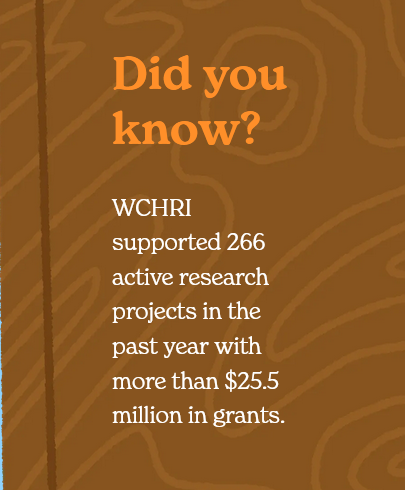
|
|
| |
Traditional exercise recommendations for individuals with Type 1 diabetes have predominantly been based on studies involving young, fit men, leaving a significant gap in understanding the unique needs of women.
Recent research led by Dr. Jane Yardley at the University of Alberta and the Montreal Clinical Research Institute is addressing this disparity by focusing on how hormonal fluctuations during the menstrual cycle and post-menopause affect blood glucose levels during physical activity.
Preliminary findings suggest that women may experience a higher risk of hypoglycemia during the luteal phase of their cycle, highlighting the importance of tailored insulin adjustments. This groundbreaking work aims to provide more precise guidelines, empowering women to exercise safely and effectively without the fear of low blood sugar episodes.
|
| |
|
|


